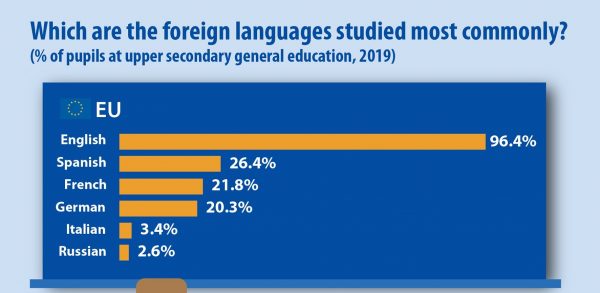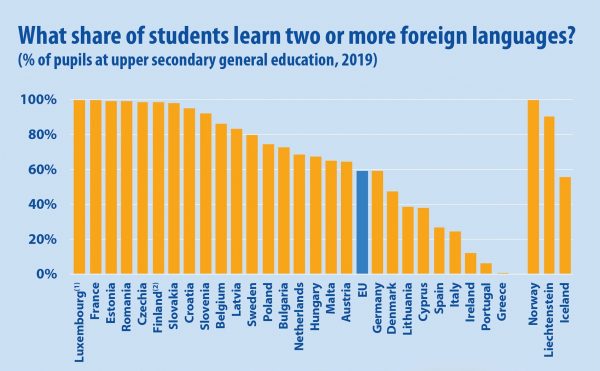![Eurostat – Greece’s ranking in foreign languages is simply disappointing [Chart]](https://www.ot.gr/wp-content/uploads/2021/09/language.jpg)
Knowledge of foreign languages is an essential tool for the citizens of the European Union – and not only – for communication with other cultures, professional development, travel, contact with new cultures, peoples and societies.
It is well known that such skills are required and encouraged in many workplaces and that they can facilitate communication in a variety of other contexts.
According to Eurostat, in 2019, 59% of upper secondary students (ISCED level 34) studied two or more foreign languages in the EU.
In two EU countries, Luxembourg and France, all secondary general education students studied two or more foreign languages. Estonia, Romania, the Czech Republic and Finland also had a large proportion of students studying two or more languages (all 99%), followed by Slovakia (98%), Croatia (95%) and Slovenia (92%). .
Greece at the bottom
Eurostat data paint a very unpleasant picture for Greece, as it not only figures at the end of the ranking, but is by far the worst of all EU member states, in terms of this performance. Only 1% of students in secondary general education studied two or more foreign languages in 2019.
A low percentage of students was also recorded in: Portugal (6%), Ireland (12%), Italy (25%) and Spain (27%).

The most popular language
In 2019, English was the most frequently studied foreign language at the level of secondary general education in the EU, with 96% of students learning it. Spanish ranks second (26%), followed by French (22%), German (20%) and Italian (3%). In addition, Russian was the non-Community language most frequently learned in the EU (3%), especially in Estonia (68%) and Latvia (57%), followed by Lithuania (30%) and Bulgaria (24%). 
Latest News

PM Mitsotakis to Chair New Democracy’s Committee Meeting
Today’s meeting is seen as a crucial opportunity to halt internal disputes within ND and reaffirm unity within the party.

Trump Tariffs Jeopardize Growth: Piraeus Chamber of Commerce
The tariffs, aimed at reducing the U.S. trade deficit, are expected to have both direct and indirect effects on the European economy

EU Condemns Trump Tariffs, Prepares to Retaliate
As tensions escalate, the EU is expected to continue negotiations with Washington while preparing for potential economic retaliation.

The Likely Impact of Trump Tariffs on Europe and Greece
Trump tariffs are expected to negatively affect economic growth in the Eurozone while Greece's exports could take a hit.

Motor Oil Results for 2024: Adjusted EBITDA of 995 mln€; Proposed Dividend of 1.4€ Per Share
Adjusted EBITDA for 2024 was down 33% yoy. The adjusted profit after tax for 2024 stood at 504 million euros, a 43% decrease from the previous year

Cost of Living: Why Greece’s 3% Inflation Is Raising Alarm
Greece appears to be in a more difficult position when it comes to price hikes, just as we enter the era of Trump’s tariffs.

Fitch Ratings Upgrades the Four Greek Systemic Banks
NBG’s upgrade reflects the bank’s ongoing improvements in its credit profile, Fitch notes in its report, including strong profitability, a reduction in non-performing exposures (NPEs), and lower credit losses

Trump to Announce Sweeping New Tariffs Wednesday, Global Retaliation Expected
With Trump's announcement just hours away, markets, businesses, and foreign governments are bracing for the fallout of one of the most aggressive shifts in U.S. trade policy in decades.

Inflation in Greece at 3.1% in March, Eurostat Reports
Average inflation in the eurozone settled at 2.2%, compared to 2.3% in February

Greece’s Unemployment Rate Drops to 8.6% in February
Despite the overall decline, unemployment remains higher among women and young people.

























![ΕΛΣΤΑΤ: Αυξήθηκε η οικοδομική δραστηριότητα κατά 15,6% το Δεκέμβριο [πίνακες]](https://www.ot.gr/wp-content/uploads/2025/03/DSC9655-2-1024x569-1-90x90.jpg)

![Δασμοί Τραμπ: Οι επιπτώσεις στις ελληνικές εξαγωγές και στην ευρωπαϊκή οικονομία [γραφήματα]](https://www.ot.gr/wp-content/uploads/2023/10/ot_exagog_ISRAEL-600x352.png)















 Αριθμός Πιστοποίησης
Αριθμός Πιστοποίησης